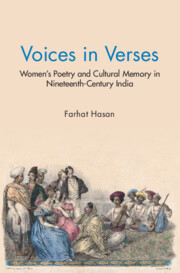Book contents
- Frontmatter
- Dedication
- Contents
- Acknowledgements
- A Note on Transliteration
- List of Abbreviations
- 1 Introduction
- 2 Unravelling the Texts: Memory, Reforms, and Literary Sulh-i-Kul
- 3 Representing an Inclusive Literary Culture: Women Poets in the Bazaars and Kothas
- 4 Representing the Kothas: The Two Sisters in the Literary Sphere
- 5 Commemorating Women Poets: Memory, Gender, and the Literary Culture in the Persianate World
- 6 Secluded Poets in Literary Spaces: Memorializing Female Rulers, Consorts, and Memsahibs
- 7 Conclusion
- Glossary
- Bibliography
- Index
1 - Introduction
Published online by Cambridge University Press: 06 March 2024
- Frontmatter
- Dedication
- Contents
- Acknowledgements
- A Note on Transliteration
- List of Abbreviations
- 1 Introduction
- 2 Unravelling the Texts: Memory, Reforms, and Literary Sulh-i-Kul
- 3 Representing an Inclusive Literary Culture: Women Poets in the Bazaars and Kothas
- 4 Representing the Kothas: The Two Sisters in the Literary Sphere
- 5 Commemorating Women Poets: Memory, Gender, and the Literary Culture in the Persianate World
- 6 Secluded Poets in Literary Spaces: Memorializing Female Rulers, Consorts, and Memsahibs
- 7 Conclusion
- Glossary
- Bibliography
- Index
Summary
This work is an exploratory study of the commemoration of women in cultural spaces during the early colonial period in South Asia. Based on a reading of the rather neglected compendia of women writers composing verses in Urdu and Persian in the varied and multiple pasts of Hindustan, it looks at memories of women's active participation in the literary spaces. Written in the nineteenth century, these compendia (tazkiras) written in Urdu were texts of memorialization, and reproduced memories of the freshness and depth that women poets brought to the literary culture. I read these texts as, following Pierre Nora, ‘sites of memory’ (lieu de memoire), and the life stories and poetic compositions found therein indeed serve to remind us of women's participation in the ‘literary public sphere’. These texts are not acts of recollection, but exercises in construction crucially motivated by significant sociopolitical considerations, one of which was to push for women's literacy within an indigenous frame of reference and to dispel the picture of the culture in Hindustan, found in British imperial writings and policy initiatives, as marked by inertia and stasis, particularly in matters relating to the lives of women.
This study then contests the commonplace assumption that the literary public sphere in the colonial period was markedly homosocial and gender exclusive, and argues instead that female scholars actively participated in shaping the norms of aesthetics and literary expression, and introduced fresh signifiers and linguistic practices to apprehend their emotions, experiences, and world views. Based on a reading of the largely ignored tazkiras of women poets, I suggest here that their compositions could be seen as a form of, in the language of Foucault, ‘erudite’ knowledge in that they enriched the literary space, even as they evoked considerable anxieties, and stood in a paradoxical relationship with the dominant episteme, both reinforcing and challenging its cultural assumptions and truth-claims. Women's poetry was neither antithetical nor excluded from the prevailing episteme and was in circulation in dispersed cultural spaces, such as the salons of the courtesans, the marketplace, household assemblies, and literary meetings. Indeed, in memorializing their voices from such dispersed locations, the authors of women's tazkiras were undertaking a genealogical exercise of recovering the ‘subjugated’ and suppressed voices in literary culture.
- Type
- Chapter
- Information
- Voices in VersesWomen's Poetry and Cultural Memory in Nineteenth-Century India, pp. 1 - 20Publisher: Cambridge University PressPrint publication year: 2024



